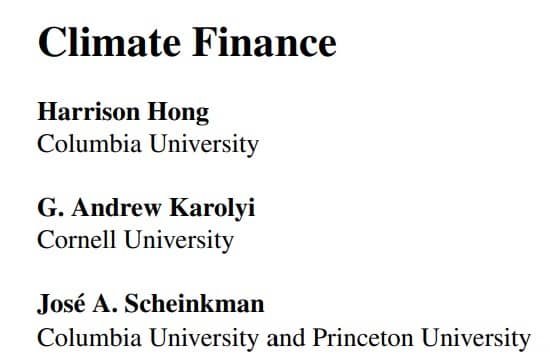Climate finance
Climate finance is the study of local and global financing of public and private investment that seeks to support mitigation of and adaptation to climate change. In 2017, the Review of Financial Studies launched a competition among scholars to develop research proposals on the topic with the goal of publishing this special volume. We describe the competition, how the nine projects featured in this volume came to be published, and frame their findings within what we view as a broader climate finance research program.

Climate finance is defined by the United Nations Framework Convention on Climate Change (UNFCCC) to be “local, national, or transnational financing—drawn from public, private, and alternative sources of financing—that seeks to support mitigation and adaptation actions that will address climate change.” It is about investments that governments, corporations, and households have to undertake to transition the world’s economy to a low-carbon path, to reduce greenhouse gas concentrations levels, and to build resilience of countries to climate change. The European Commission estimates that energy and infrastructure investments, mainly from the private sector, would have to rise to 2.8% of European Union gross domestic product (GDP) from 2% today (or an additional
These large estimates only coarsely encapsulate the significant risks of global warming for firm profits, capital markets, and household wealth. Many sectors, ranging from energy, food, and insurance to real estate, are directly impacted by risks generated by a potential price on carbon, adverse shocks to agricultural productivity, or exposures to rising sea levels, to name a few. Underlying these concerns are difficult questions regarding the distribution of damages from global warming, how society should price and mitigate risks from global emissions, and whether capital markets—to the extent that they can assess and price these exposures—can raise such large sums and potentially help households and institutions hedge climate change risks.
Answers to these questions in turn depend on expectations that agents in the economy hold. A case in point is that ongoing worries by some in the private sector about wavering commitments to the Paris Climate Agreement goals have prompted efforts to mobilize, such as the Climate Finance Leadership Initiative and the newly launched Principles for Responsible Banking.3 Such sustainable investing initiatives have the potential to influence the cost of capital for high carbon emissions companies even in the case of explicit carbon taxes. Raising the trillions necessary over the coming decades to address global warming will also no doubt rely on financial innovations.
Even though questions such as pricing and hedging of risks, the formation of expectations, and financial innovations are natural ones for financial economists to tackle, little research has been published to date in our top finance journals. The award of 2018’s Nobel Prize in Economics to William Nordhaus for his work on integrated assessment models for climate change going back to the mid-1970s (for example, Nordhaus 1977) reminds us of the missed research opportunity for financial economists to assess the risks associated with climate change as a global externality (Nordhaus 2019).
The current volume represents the effort of the Review to remedy this dearth of research on climate finance. It was a problem that the editorial team of the Review recognized back in 2016. To this end, the editors, with the support of the Society for Financial Studies, launched a competition in 2017 using a novel editorial protocol—a Registered Reports (RR) format—that drew 106 submissions from scholars around the world on the topic. This competition paralleled in structure another one focused on the similarly under-researched topic of fintech that was published in the Review in May 2019 (see Goldstein, Jiang, and Karolyi 2019).
The idea behind RRs, a peer-reviewed editorial protocol developed in the cognitive sciences by the journal Cortex, is simple. Authors submit for review a research plan that designs an experiment, outlines the data to be collected, and describes potential interpretations of what findings may come; expert reviewers judge the proposed plan on its merit and not on the basis of the findings. Further, editors offer in-principle acceptance of the submission before final results are known. While the primary goal of RRs is to eliminate disincentives to publish negative or non-results and to mitigate publication bias, the editors of the Review believed this would be the ideal editorial protocol for a topic as controversial as that of climate change and global warming.4 Not only would it allow for the truth about the potential economic consequences of climate change for financial markets to come to the fore, but it might provide the incentives needed to draw out hesitant scholars who might be inclined to take on new research on climate finance.
We, as the editors of this special volume, needed to secure additional support beyond that of the Society to make this competition work. Major financial support came from Norges Bank Investment Management for the preliminary project proposal workshop at Columbia University (November 2017) and for a conference co-hosted by Imperial College Business School in London (October 2018) at which the findings would be unveiled. We also received additional support from the Program for Economic Research at Columbia University, the Brevan Howard Centre at Imperial University, and two of the Prince of Wales’s charities, Accounting for Sustainability (A4S) and the University of Cambridge Institute for Sustainability Leadership (CISL).
The editorial team assembled a twenty-three-person scientific council of reviewers to help review the proposals among the first pass of 106 submissions and the finalists who were to be invited to the Columbia University workshop, at which a number of them served as discussants.5 We also drew on dozens of additional anonymous reviewers who participated in one or more of the three rounds of reviews that each of the ultimately nine successful proposals survived.
In the remainder of this editorial, we will outline how the research competition evolved and what we received, and then lay out the findings on climate finance that this special volume represents within what we view going forward as a broader climate finance research agenda.






